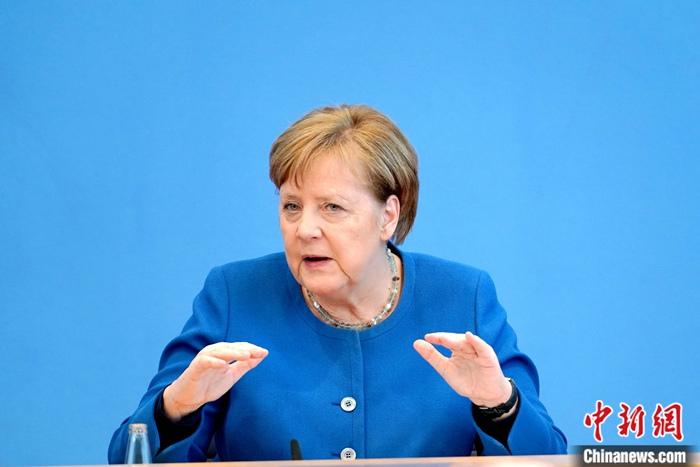China News Agency, Berlin, September 27th. Title: The Merkel era officially ends: "She" changed Germany
China News Agency reporter Peng Dawei
At midnight on the 26th local time, the preliminary prediction results of the general election announced by German TV One showed that the Social Democratic Party is expected to become the largest party in the Bundestag with a 25.8% vote rate.
Although Merkel will continue to serve as the prime minister of the caretaker cabinet until the next government completes the formation of the cabinet, for Germany, an era shaped by this female prime minister has officially ended.
Data map: German Chancellor Merkel.
Photo by China News Agency reporter Peng Dawei
Changing the "Female Chancellor" of Germany
From the first general election in the Federal Republic of Germany in 1949 to before Merkel came to power in 2005, "female Chancellor" was only a "theoretical" word in the German dictionary.
Merkel used her 16 years in power to change the habits of German speakers.
When people talk about the leader of the largest European economy, the first reaction is always a "female prime minister."
A foreign journalist once joked that the only place that reminds people of the existence of a male prime minister in this country is almost the word "Kanzleramt" (literally "male prime minister's office") and the predecessors hanging in it. The Prime Minister looks like it.
"Female Prime Minister" has also become the title of a new Merkel biography published in August this year.
The biographer Ursula Weidenfeld, who is also a woman, described a "woman who changed Germany" in the book.
Although Merkel only recently "relaxed" to call herself a feminist.
But the fact that she has been the leader of the EU economy for 16 years as a woman has inspired countless women to participate in politics.
"Many girls will say after seeing her that I can be a responsible and powerful position." Former US President Bush Jr. described Merkel as a role model for women in a documentary recently broadcast by German media because "she So dignified and decent."
In addition to being the first female Chancellor, Merkel was also the first German Chancellor from the former East Germany.
Her political career itself has rewritten contemporary German history.
The pragmatic background of the "crisis prime minister"
"Bo Le", who led Merkel's rapid rise in the political arena, and the greatest historical achievement of the late former Chancellor Kohl was the realization of German reunification; Merkel's predecessor, Schroeder, launched the "2010 Agenda" against all opinions. (Agenda2010), despite the in-depth reform of the social security system that frustrated the public opinion of the Social Democratic Party and eventually lost the election, it also helped Germany stand out during the 2008 financial crisis and become the most successful country in the Eurozone to survive the crisis.
Compared with the two predecessors, Merkel does not seem to have drastically forward-looking plans, but is busy with crisis management.
In July this year, she listed the five crises she led Germany through at the last summer press conference: the global financial crisis, the European debt crisis, the refugee crisis, the climate crisis and the new crown epidemic.
She has made two unexpected policy changes: withdrawing from nuclear energy and opening the door to refugees, both of which are responses to crisis situations, rather than taking the initiative.
"I feel that she may not be remembered by the history of future generations, because she did not propose a vision for the future of the European Union, or the future of Germany." Former Greek Finance Minister Giannis Varufakis once sharply criticized Merkel's "pragmatist" side.
"'Pragmatism' has now become synonymous with lack of vision and change in the context of German politics. My grandparents may miss Merkel, but it is another matter for me." A young German voter is voting Told reporters on the same day.
"Those who have too many visions should go to see a doctor." Almost a response to outside criticism of his "pragmatism", Merkel quoted in a speech at the funeral of former German Chancellor Schmidt in 2015 The famous saying of the old prime minister.
Another of her biographers, Ralph Borman, wrote in the book "The Female Prime Minister and Her Time": "Merkel puts the coffin on Schmidt's ruling career in this way-'The Prime Minister's Merit Reflected in the crisis he has overcome', a pragmatic politician, thinks carefully before making a decision, and must prove that he has the ability to play the role of the'crisis response manager' during his administration-this is clearly a lady talking about herself!"
Post-Merkel era: maintaining continuity in change
In the latest report of the British Economist Intelligence Unit, the post-election German politics is summarized as "maintaining continuity amidst changes."
The think tank analyzed that although this year's general election is full of uncertainty for Germany, which is known for its quiet political arena, it is certain that Germany's policymaking will still maintain a central position and maintain a consensus orientation.
In terms of relations with China, the German Kiel World Institute pointed out in a research report this month that although the election platforms of the major political parties leading in the current general election in Germany have different expressions of their policies towards China, they all emphasized that China’s Economic and political importance. To solve the key issues facing the future, China will continue to play an important cooperation and negotiation partner between Germany and Europe.
"Relations with China will not change suddenly, and I am very confident about it." Alexander Schweitzer, a member of the presidency of the German Social Democratic Party, told a reporter from China News Agency.
(over)

